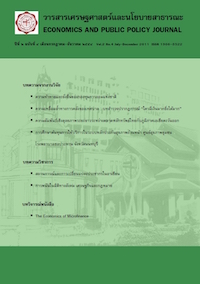ความท้าทายและยั่งยืนของกองทุนการออมแห่งชาติ
Main Article Content
บทคัดย่อ
ในขณะที่สังคมไทยก้าวเข้าสู่สังคมสูงอายุมากขึ้น ด้วยจำนวนผู้สูงอายุที่เพิ่มขึ้นทุกปี การสร้างหลักประกันทางรายได้เพื่อการเกษียณอายุจึงเป็นเรื่องที่สมควรได้รับการพิจารณาและส่งเสริมอย่างจริงจัง โดยการให้เงินอุดหนุนเพื่อสร้างความมั่นคงทางรายได้ขั้นพื้นฐานแก่ผู้สูงอายุด้วยการจ่ายเบี้ยยังชีพคนชรานั้น ในอนาคตคงต้องเปลี่ยนมาใช้ระบบการทดสอบรายได้แทน โดยจ่ายเงินอุดหนุนเฉพาะแก่ผู้สูงอายุที่ยากจน และขาดแคลนรายได้อย่างแท้จริง เพื่อช่วยให้ผู้สูงอายุที่ยากจนจริงมีรายได้ที่เพียงพอแก่การดำรงชีพตามมาตรฐานการครองชีพของไทย ด้วยเหตุนี้ การส่งเสริมการออมโดยการกำหนดอัตราเงินสะสมและเงินสมทบ ดังเช่นกองทุนการออมแห่งชาติ จึงเป็นมาตรการที่ควรได้รับการส่งเสริมอย่างจริงจังเพื่อให้พลเมืองทุกคน โดยเฉพาะแรงงานนอกระบบซึ่งยังไม่มีหลักประกันรายได้เพื่อการชราภาพ มีรายได้ที่เพียงพอแก่การครองชีพหลังการเกษียณอายุ โดยการออมภาคสมัครใจน่าจะเป็นจุดเริ่มต้นที่เหมาะสมสำหรับประเทศไทยในปัจจุบัน
อย่างไรก็ตาม การศึกษาพบว่า อัตราการสมทบและเงินสมทบของรัฐในกองทุนการออมแห่งชาติมีจำนวนน้อยเกินไปที่จะสร้างหลักประกันรายได้แก่แรงงาน จึงไม่น่าจูงใจให้แรงงานเข้าร่วมกองทุน การศึกษานี้เสนอว่ารัฐควรเปลี่ยนอัตราการสมทบเป็น 1:1 ทุกช่วงอายุ และเพิ่มเงินสมทบสูงสุดเป็นไม่เกิน 2,400 บาทต่อคนต่อปี เพื่อสร้างวินัยในการออมแก่แรงงาน และเป็นแรงจูงใจให้แรงงานมาเข้าร่วมกองทุนตั้งแต่อายุน้อย และเพิ่มเงินออมเมื่อมีรายได้เพิ่มขึ้น เพื่อให้มีรายได้ที่เพียงพอแก่การครองชีพหลังการเกษียณอายุในที่สุด
National Saving Fund: Its Challenges and Sustainability
As Thailand approaches the ageing society with a rapid increase in the number of elderly people, income securities for retirement is an important issue deserved serious consideration. Due to government budget limitation, the universal income payment to all citizens aged 60 and over in the future should adapt the means-tested system so as to make the payment only to the needy elderly to ensure that poor elderly have enough income to keep up with the standard of living in Thailand. For this reason, an encouragement for saving such as the National Saving Fund in which the government determines the range of individual saving and the rate of matching grant is the policy worth to advocate in particular for the informal workers who do not yet have any saving for retirement. Voluntary mechanism would be a good starting point for the Fund.
Nonetheless, this study found that the capitation of government’s matching grant was too low to ensure that retired workers would have enough income for retirement. This study suggests that government should raise the matching rate to 1:1 through all age groups, and double the capitation to not exceed BHT 2,400 per person a year so as to encourage saving habit and to motivate informal workers to participate in the National Saving Fund while they are young and increase saving as their income increase.
Article Details
สงวนลิขสิทธิ์ © 2553 คณะเศรษฐศาสตร์ มหาวิทยาลัยศรีนครินทรวิโรฒ
คณะเศรษฐศาสตร์ มหาวิทยาลัยศรีนครินทรวิโรฒ จัดพิมพ์วารสารเศรษฐศาสตร์และนโยบายสาธารณะ เพื่อเผยแพร่บทความวิชาการทางเศรษฐศาสตร์ นโยบายสารธารณะ และสาขาอื่นๆที่เกี่ยวข้อง ทัศนะและข้อคิดเห็นใดๆ ที่ปรากฏในวารสารเป็นความคิดเห็นส่วนตัวของผู้เขียน โดยบทความที่ได้รับการตอบรับจะถือเป็นลิขสิทธิ์ของคณะเศรษฐศาสตร์ มหาวิทยาลัยศรีนครินทรวิโรฒ
บรรณาธิการ อาจารย์ ดร.พลพัธน์ โคตรจรัส


